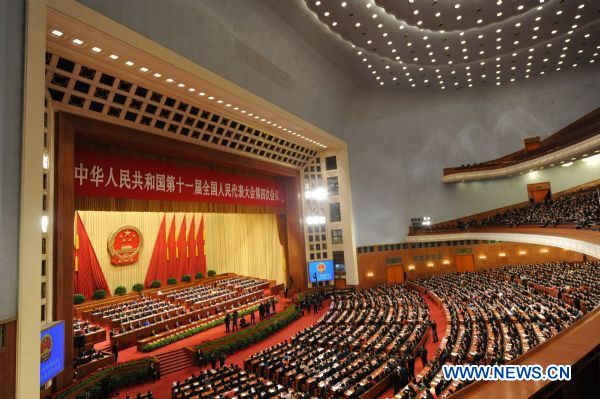
The Fourth Session of the 11th National People's Congress holds its closing meeting at the Great Hall of the People in Beijing, China, March 14, 2011. (Xinhua/Yang Zongyou)
by Xinhua writer Zhang Zhengfu
BEIJING, March 14 (Xinhua) -- Chinese lawmakers overwhelmingly adopted a national plan to steer the world's second largest economy into a path of fairer and greener growth in the next five years.
The 12th Five-Year Plan for National Economic and Social Development was approved by the legislature, the National People's Congress (NPC), with 2,778 out of a total of 2875 deputies voting for it.
The world is expected to gain from a China where rising living standards will boost domestic consumption, and harsher targets on energy use will contribute more to the world's battle against global warming, according to the five-year plan.
Building a fairer society has been a core goal of the government which has worked to spread the wealth more evenly among its around 1.34 billion population, but income increases have lagged behind economic growth.
Adopting the plan is one thing, and how to implement it is another.
In a press conference after the conclusion of the parliamentary session, Premier Wen Jiabao pointed to outdated mindset and the GDP-oriented criteria for evaluating the performance of government officials as obstacles that might keep the five-year plan from being fully carried out.
The central government would adopt new performance evaluation criteria for local governments and give more weight to the efficiency of economic growth, environment protection and living standards, said Wen.
"Two figures are more important than GDP growth rate. They are the proportion of the expenditure on education in the national economy, and the ratio of spending on research and development in the GDP," said Wen.
"Without radically changing the mindset and criteria assessing the performance of our officials, it would be difficult to achieve the goals set by the five-year plan," Wen said.
The blueprint said that China will commit to boosting spending on education, healthcare and public housing, initiatives intended to narrow the wealth gap between the rich and poor.
China aims to create 45 million urban jobs over the next five years, "reduce the number of people living in poverty," increase incomes, raise minimum wages and basic pensions and hike the individual income tax threshold, according to the plan.
"Through unremitting efforts, we will reverse the trend of a widening income gap as soon as possible and ensure that the people share more in the fruits of reform and development," Wen said in his government work report earlier this month.
While pledging to make China a fairer society which would provide new and stronger sources for future growth, the five-year program also shows China plans to follow a more sustainable and low-carbon development path.
China used a series of punishing "administrative" measures to try to meet a target to reduce 2005 levels of energy intensity by 20 percent by the end of last year, forcing thousands of energy-guzzling enterprises across the country to shut down after cutting off their power supplies.
The five-year plan said China will boost the proportion of non-fossil fuels in primary energy consumption to 11.4 percent, and energy consumption and carbon dioxide emissions per unit of GDP should be reduced by 16 percent and 17 percent respectively during the five years.
Experts lauded the tougher determination which would reinforce the world's efforts to meet the challenges posed by global warming.